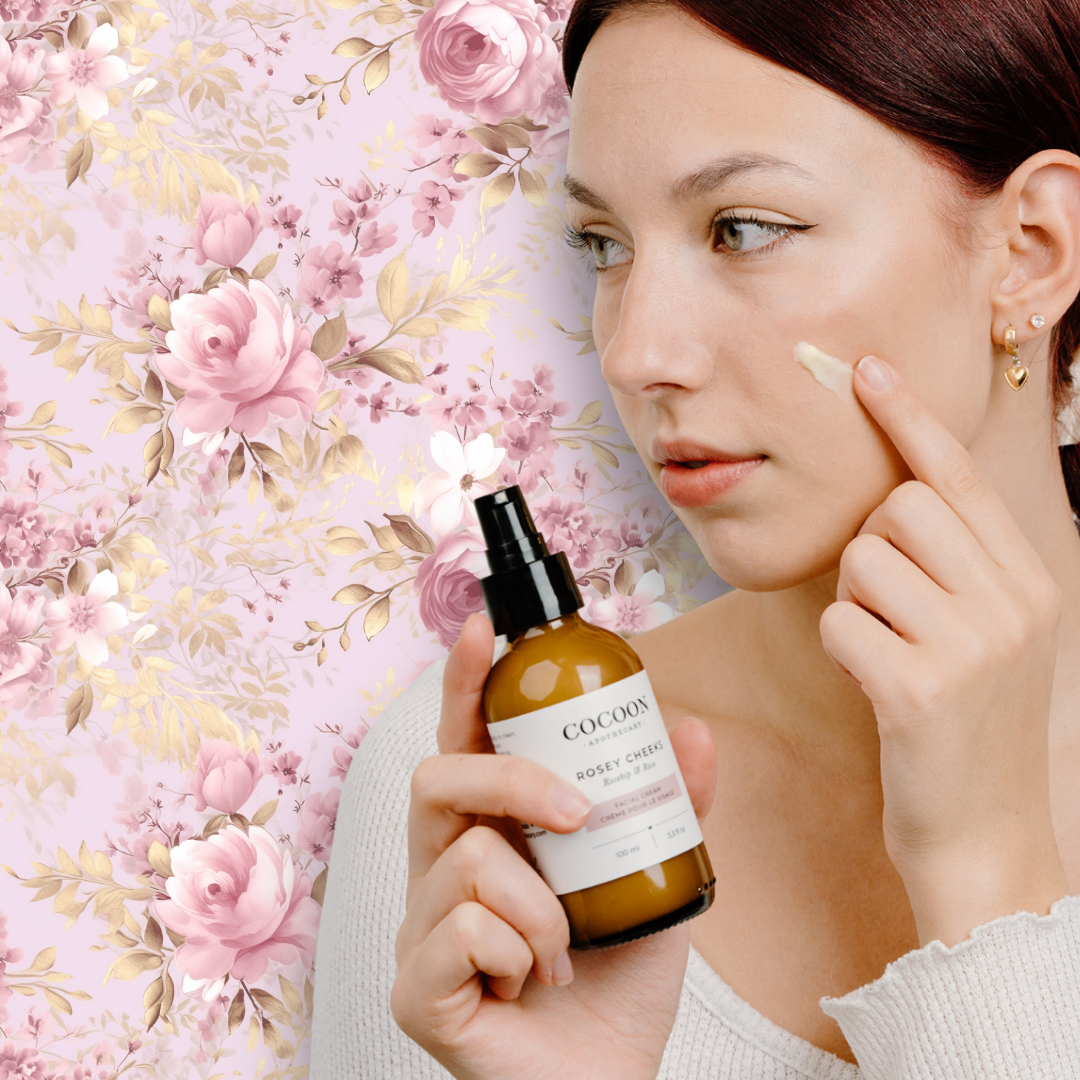Sensitive skin is a skin type that reacts more easily to external factors like skincare products, environmental elements, or lifestyle changes. People with sensitive skin often experience symptoms such as redness, itching, burning, or dryness. These reactions can occur quickly after exposure to triggers such as harsh skincare, weather changes, or even stress. You might have sensitive skin if you notice frequent discomfort or irritation after using certain products, or if your skin becomes red and inflamed in response to weather extremes or pollution. Identifying sensitive skin involves observing these reactions and noting if your skin requires gentle, soothing products to avoid irritation.
About Essential Oils
Essential oils have often been generalized as irritants for sensitive skin, but this is a misconception stemming from a lack of awareness and education in the industry. The truth is, essential oils have diverse chemical compositions, each with unique properties. Some, like chamomile and lavender, are well-known for their anti-inflammatory and soothing effects, making them beneficial for sensitive skin. It’s important to recognize that not all essential oils are the same; their impact on the skin varies significantly depending on their specific makeup and concentration. Unfortunately, the beauty industry and some editors have hastily grouped all essential oils into a single category, giving them an unfairly negative reputation. This oversimplification ignores the fact that many essential oils have been used for centuries for their healing and calming properties. The key is in the careful selection and proper formulation of these oils to harness their benefits safely and effectively.
Ingredients to Avoid with Sensitive Skin
Alpha Hydroxy Acids (AHAs)
Alpha Hydroxy Acids (AHAs), such as glycolic acid and lactic acid, are commonly used in skincare for their exfoliating properties, but they can be problematic for sensitive skin types. AHAs work by dissolving the bonds between dead skin cells, promoting cell turnover. However, this process can be too harsh for sensitive skin, stripping away its natural protective barrier and leading to increased redness, irritation, and dryness. Sensitive skin already has a compromised barrier function, so using AHAs can exacerbate sensitivity by causing more inflammation and making the skin more vulnerable to environmental stressors. The high potency and potential for overuse of AHAs can also disrupt the skin's pH balance, leading to further irritation. Therefore, while AHAs can benefit some skin types, they are generally not recommended for those with sensitive skin, who require gentler, soothing alternatives.
Vitamin C
Vitamin C can be problematic for sensitive skin due to its strong acidic nature. Most vitamin C serums, especially those containing L-ascorbic acid, have to be formulated at a low pH to remain stable and effective. This acidity can disrupt the skin's natural pH balance, leading to irritation, redness, dryness, and even peeling, particularly for those with sensitive skin types. When the skin's pH is repeatedly altered, it can compromise the skin barrier, making it more vulnerable to environmental stressors and irritants. Additionally, the potency of vitamin C plays a role in its potential to irritate. Higher concentrations, especially when applied too frequently, can push sensitive skin beyond its tolerance level, causing inflammatory responses like redness, breakouts, or dermatitis.
Retinol
This ingredient often leads to irritation, including redness, dryness, and peeling, particularly during the initial phase of use. Sensitive skin, which already has a compromised barrier, is more prone to experiencing these side effects, as retinol can exacerbate irritation and discomfort. Additionally, retinol's exfoliating properties can further weaken the skin barrier, making it more susceptible to external stressors and inflammation. The drying effect of retinol strips away natural oils essential for maintaining moisture, which is especially problematic for sensitive skin that requires extra hydration and gentle care to maintain balance. Retinol also increases the skin's sensitivity to sunlight by thinning the outer layer, making sensitive skin more vulnerable to UV damage, redness, and potential sunburn.
Chemical Sunscreens
Chemical sunscreens can be problematic for sensitive skin due to the active ingredients they contain, which can cause irritation and allergic reactions. These sunscreens work by absorbing UV radiation and converting it into heat, a process that can be sensitizing, especially for those with already reactive skin. Some of the common chemical sunscreen ingredients include: oxybenzone, avobenzone, octinoxate, octocrylene, homosalate, octisalate. These ingredients can penetrate the skin’s surface, leading to potential irritation. For sensitive skin, this penetration can disrupt the skin barrier, causing redness, stinging, or itching. Additionally, oxybenzone and octinoxate have been known to cause allergic reactions or dermatitis in certain individuals. Chemical sunscreens can also increase the risk of heat-related irritation, as they convert UV rays into heat on the skin's surface. For those with sensitive skin, this can exacerbate conditions like rosacea or general skin redness. Unlike physical (mineral) sunscreens that sit on the surface of the skin and reflect UV rays away, chemical sunscreens are absorbed into the skin, which can lead to further irritation and discomfort for sensitive skin types. For those with sensitive skin, opting for mineral sunscreens containing zinc oxide or titanium dioxide is often a safer choice. These ingredients provide broad-spectrum protection without the risk of chemical irritation, making them more suitable for delicate skin.
Ideal Ingredients for Sensitive Skin
Essential fatty acids (EFAs)
Omega-3 (linolenic acid) and omega-6 (linoleic acid) are beneficial for sensitive skin because they help strengthen the skin’s natural barrier, reducing moisture loss and protecting against environmental irritants. They have anti-inflammatory properties that soothe irritation, redness, and inflammation, making the skin more resilient and less reactive. EFAs also support cell membrane health, improving the skin's texture and hydration levels, which is crucial for maintaining a balanced, calm complexion in sensitive skin types.
Rose
Rose-based ingredients like rose extract, rose hydrosol, and rosehip oil are ideal for sensitive skin due to their cooling, soothing, and anti-inflammatory properties. Rose petal extract contains anti-inflammatory compounds that help reduce redness and calm irritation, while also providing antioxidant protection against environmental stressors. Rose petal hydrosol, or rose water, is gentle and helps balance the skin's pH, offering lightweight hydration without causing sensitivity. Rosehip seed oil is rich in essential fatty acids, which strengthen the skin barrier and lock in moisture, along with carotenes that promote skin regeneration and healing. Together, these ingredients work to calm, protect, and hydrate sensitive skin, promoting a balanced and healthy complexion.
Lavender
Lavender is beneficial for sensitive skin due to its anti-inflammatory properties, which help soothe skin irritation, reduce redness, and calm conditions like eczema and psoriasis. Compounds like linalool and linalyl acetate in lavender inhibit the production of inflammatory molecules, reducing swelling and itching. Additionally, lavender has antibacterial properties that can help regulate sebum production and prevent acne. It also promotes relaxation and reduces stress-related skin conditions, making it an excellent choice for sensitive and reactive skin.
Polysaccharides
Polysaccharides like those found in aloe vera and rose are excellent for sensitive skin because they have soothing, hydrating, and anti-inflammatory properties. Aloe vera contains polysaccharides that form a protective layer on the skin, helping to lock in moisture and promote healing. This helps reduce redness, irritation, and inflammation, making it ideal for calming sensitive or reactive skin. Additionally, polysaccharides support the skin's natural barrier function, enhancing its ability to retain moisture and defend against external irritants, leading to a more balanced and less reactive complexion.
Water
Water is essential in sensitive skincare formulas because it acts as a soothing base that hydrates the skin without causing irritation. It helps to dilute potent active ingredients, making them gentler and reducing the risk of adverse reactions. Water also aids in the absorption of other ingredients, ensuring they penetrate the skin effectively while maintaining a lightweight texture. This is crucial for sensitive skin, which benefits from lightweight, non-irritating hydration that supports the skin's natural barrier function and helps maintain moisture balance.
Caring for sensitive skin involves recognizing the unique needs of your skin type and selecting products with ingredients that soothe and protect. While some ingredients can exacerbate sensitivity, others, like rose, lavender, and aloe vera, offer calming benefits. By choosing the right skincare and being mindful of potential irritants, you can maintain a balanced, healthy complexion that feels comfortable and looks radiant.

